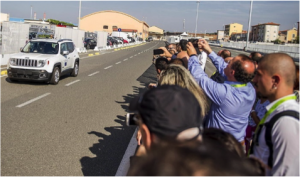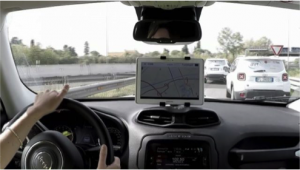“Smart roads for AD cars”: the AUTOPILOT project in Livorno
 |
 |
Livorno (Italy) – A week of technological experimentation on the port of Livorno, featuring dozens of installations set up by world-class companies and a two days of conferences and field demonstrations on 18th and 19th of October, has just ended.
Main goal was to show how the integration of devices in vehicles, on roadside infrastructure, in radio rooms and information systems, allow automatic driving using information and communication technologies.
After hosting the first European field experimentation on the interoperability of intelligent transport systems (the ETSI Plugtest) between November 9th and 17th, 2016, the Livorno haven was designated by the European Union as a national testing site for new intelligent driving services. The objective is clear: to connect every type of car and heavy vehicle to the port and road infrastructures of the Tuscany Region.
The initiative, organized by CNIT and the Authority of the Northern Tyrrhenian Sea Port System with the support of ERTICO, Tuscany Region and TTS Italy is a milestone of AUTOPILOT, one of the five projects funded by the European Commission through the Horizon 2020 call for Large-Scale Pilots enabling the Internet of Things.
AUTOPILOT project involves 47 partners such as NEC, IBM, Huawei, VEDECOM, Continental, TNO, and T-Systems. Italian beneficiaries include the CNIT, who, by P. Pagano team, has the role of Pilot Site Leader; CNIT provided also the road side units permanently installed along all the test track, both in the port and in the highway. AVR, the company in charge of operations on FiPiLi; and TIM, who provides the digital platform for aggregating, publishing and storing data. In addition, the Mario Boella Institute of Turin who supplies the in-vehicle platform, the connected bicycle and the smart traffic light; FIAT Research Center (CRF), who supplies autonomous vehicles, and THALES, dealing with aspects related to the security of digital platforms and data.
The results achieved after 20 months of the project have been presented to the seaport industry and to public and private bodies involved in the regulation of autonomous driving on a large scale, such as cities, rail yards, or seaports.
The event has been hosted at the cruise ship terminal in the passenger area of the Port of Livorno, with a conference space, a space for working groups and live demonstrations.
